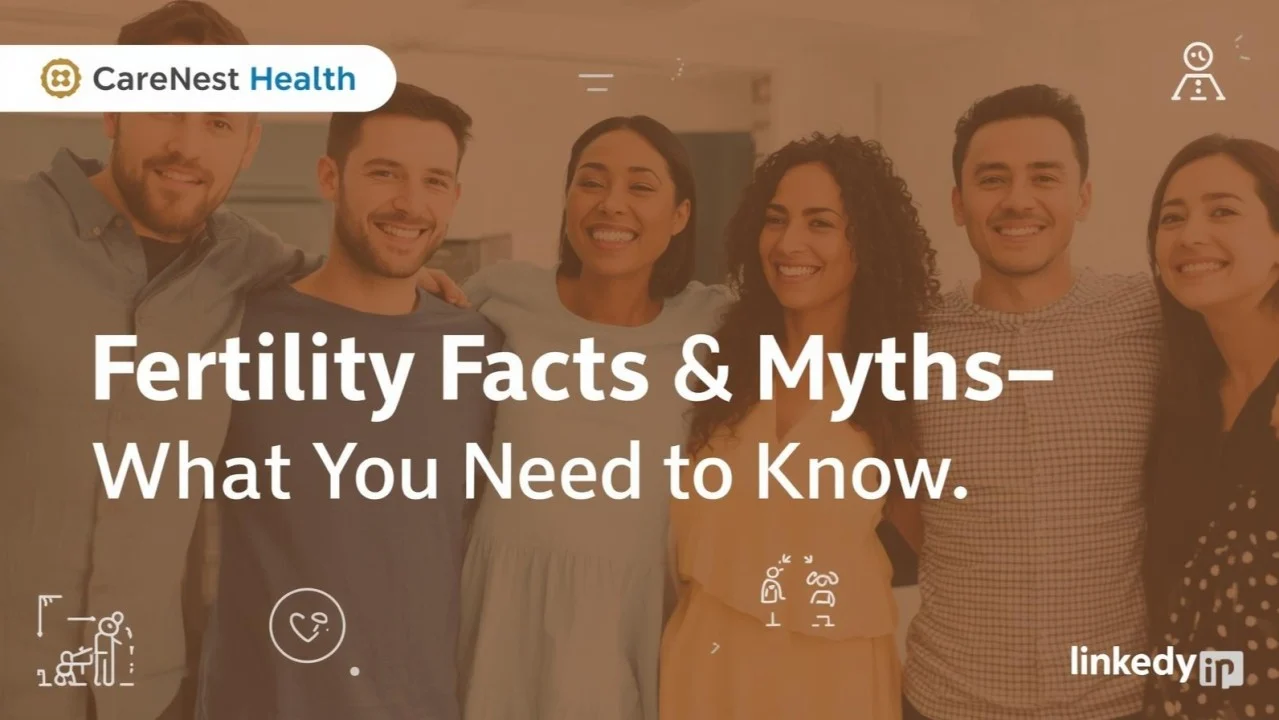
Bivir Claude Binyuy: Fertility Facts and Myths – What You Need to Know
Bivir Claude Binyuy, Midwife at
“Fertility is a deeply personal and often sensitive subject. Across Africa and globally, myths and misinformation continue to shape how individuals and couples understand their reproductive health. This edition of CareNest Health breaks down the facts, dispels common myths, and shares real-life stories that highlight the importance of evidence-based knowledge. With insights from WHO, FIGO, and evidence-based maternal and reproductive health practices (EmOC), this article aims to empower individuals and couples with clarity and confidence.
Fertility in Context: What the Evidence Says
- WHO estimates that 1 in 6 people worldwide experience infertility at some point in their lives.
- FIGO emphasizes that infertility is a medical condition, not a personal failure, and should be addressed with compassion and evidence-based care.
- In Africa, infertility affects about 10–15% of couples of reproductive age.
- In Nigeria, studies show infertility prevalence rates of 20–25%, with male factors contributing to nearly 50% of cases.
- In Cameroon, infertility rates are estimated at 15–20%, with limited access to fertility services and stigma compounding the challenge.
Common Fertility Myths vs. Facts
Myth 1: Infertility is always the woman’s fault. Fact: Male factors contribute to nearly half of infertility cases. Both partners should be evaluated.
Myth 2: If you can menstruate, you can conceive easily. Fact: Regular periods don’t always mean ovulation is normal. Conditions like PCOS or endometriosis can affect fertility.
Myth 3: Infertility is a punishment or curse. Fact: Infertility is a medical condition, not a spiritual or moral failing.
Myth 4: Age doesn’t matter if you’re healthy. Fact: Fertility declines with age, especially after 35 for women and after 40 for men.
Myth 5: Traditional remedies always solve infertility. Fact: While some herbal remedies may support health, many lack scientific evidence and can delay proper treatment.
Real-Life Stories That Inspire Change
Story 1: Grace and Emmanuel (Nigeria) Grace and Emmanuel struggled with infertility for five years. Initially, Grace was blamed by her family. After visiting a fertility clinic, tests revealed Emmanuel had low sperm count. With counseling and treatment, they conceived through assisted reproductive technology. Their story highlights the importance of evaluating both partners.
Story 2: Amina (Cameroon) Amina believed infertility was a curse. She spent years seeking traditional remedies. Eventually, she attended an EmOC-supported clinic where she was diagnosed with untreated pelvic infections from a past STI. After treatment, she conceived naturally. Her journey shows the power of evidence-based care.
Story 3: The Okafor Family (Nigeria) The Okafor’s faced secondary infertility after their first child. They discovered that untreated postpartum infections had caused blocked fallopian tubes. With laparoscopic surgery and support, they welcomed twins. Their story emphasizes the importance of postnatal care and early treatment.
Story 4: Daniel and Rose (Cameroon) Daniel and Rose faced stigma from their community after years without children. They joined a support group where they learned about lifestyle changes—healthy diet, reduced alcohol, and stress management. Within a year, Rose conceived naturally. Their story shows how lifestyle and emotional support can make a difference.
Expert Advice from Midwife BIVIR and Global Guidelines
- Seek early evaluation: If conception hasn’t occurred after 12 months of regular unprotected sex (or 6 months if over 35), seek medical advice.
- Both partners matter: Fertility is a shared responsibility. Both men and women should be tested.
- Lifestyle counts: Smoking, alcohol, obesity, and stress can reduce fertility.
- Access EmOC services: Emergency obstetric and reproductive care facilities provide safe, evidence-based interventions.
- Break the stigma: Infertility is a health condition, not a curse. Compassion and support are essential.
Dos and Don’ts for Fertility Health
Do:
- Eat a balanced diet rich in fruits, vegetables, and lean proteins
- Maintain a healthy weight
- Seek medical evaluation early
- Practice safe sex to prevent infections that can cause infertility
- Support your partner emotionally
Don’t:
- Blame one partner without medical evidence
- Delay seeking help due to stigma or myths
- Rely solely on unproven remedies
- Ignore infections or reproductive health issues
- Assume fertility is guaranteed at any age
Q and A: Fertility Questions Answered
Q: Can stress cause infertility? A: Stress alone doesn’t cause infertility, but it can affect hormones and reduce chances of conception. Managing stress improves overall health.
Q: Is infertility common in men? A: Yes. Male factors contribute to about 40–50% of infertility cases.
Q: Can lifestyle changes improve fertility? A: Yes. Healthy diet, exercise, avoiding smoking and alcohol, and managing stress can improve fertility outcomes.
Q: What treatments are available in Africa? A: Treatments range from medication and surgery to assisted reproductive technologies like IVF. Access varies by country, but more clinics are emerging.
Hints for Engagement and Future Focus
- How can communities reduce stigma around infertility?
- What role can governments play in making fertility services affordable?
- How can men be more involved in fertility discussions?
- What are the emotional and mental health impacts of infertility?
Next Edition Preview
Topic: Postnatal Care Essentials—Supporting Mothers and Newborns Beyond Birth This upcoming edition will explore the critical first six weeks after delivery, highlighting maternal recovery, newborn care, breastfeeding, and mental health, with evidence-based insights from WHO, FIGO, and NHS.”
-
Oct 11, 2025, 06:44The Global IVF Market Is Set to Reach $65B by 2032 – Meddilink
-
Feb 4, 2026, 00:43Join the 2026 Rising Stars Webinar On February 11 – SSR
-
Feb 4, 2026, 00:18Dalia Alqarni: Urinary Incontinence’s Impact on Women’s Health
-
Feb 4, 2026, 00:16New Study Reveals IVF Success for Women With Endometriosis – Fertility Plus
-
Feb 4, 2026, 00:13Tamuka Chekero: Exploring Relational Autonomy in Infertility Across Cultures
-
Feb 2, 2026, 13:04Optimal GnRH Agonist Dosage for Oocyte Maturation – Fertility and Sterility
-
Feb 2, 2026, 12:39Family Planning Challenges for Women with Lupus – The Lupus Foundation of Australasia
-
Feb 2, 2026, 12:17Anis Feki: Innovative Strategies for Bowel Endometriosis Management
-
Feb 2, 2026, 12:10Revolutionizing Testicular Cell Cultivation with 3D Bioprinting – School of Infection, Inflammation and Immunology, University of Birmingham
-
Feb 2, 2026, 12:07Cesar Diaz Garcia: Age and Its Impact on Male Fertility
